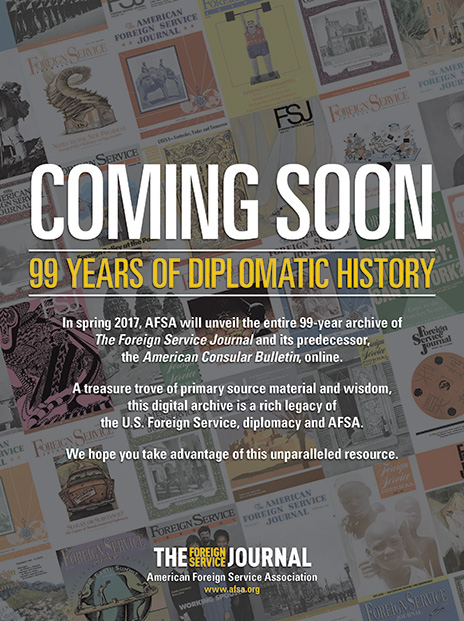Law Enforcement As an Instrument of National Power
More widely represented across the globe than any other U.S. law enforcement agency, Diplomatic Security is uniquely placed to safeguard American diplomacy.
BY RONNIE S. CATIPON

A Mobile Security Deployment agent stands watch on the perimeter while DSS special agents escort Saudi Crown Prince Mohammad bin Nayef to a meeting with Secretary of State John F. Kerry during the 2016 U.N. General Assembly in New York City.
Department of State

A DSS special agent prepares for the arrival of a diplomatic motorcade during an evening event in New York City during the 2016 U.N. General Assembly.
Department of State
Over the last century, as the world changed so have the threats that challenge the United States’ enduring national interests: safeguarding and promoting global security, economic prosperity and democracy.
The United States uses diplomatic, information, military and economic (DIME) instruments of national power to counter threats to these interests. As new threats emerged, so have new instruments of national power. The Department of Defense has acknowledged three new instruments—financial, intelligence and law enforcement—and added them to the paradigm, now termed DIME-FIL. The State Department’s Bureau of Diplomatic Security plays a considerable enabling role within the law enforcement instrument, particularly overseas. Indeed, it is arguably one of the most effective and important law enforcement agencies at the nation’s disposal.
Each agency brings its own “comparative advantage” to support the law enforcement instrument of national power. For example, no federal law enforcement agency is better at investigating threats to the homeland than the Federal Bureau of Investigation, while the U.S. Secret Service is the premier protective agency in the world. And the U.S. Drug Enforcement Administration is a model for domestic and international counternarcotics operations. Individually and collectively, these and other U.S. law enforcement agencies make powerful contributions to protecting the United States’ enduring interests.
Yet no other U.S. federal law enforcement agency is more widely represented across the globe than DS. With almost 1,000 federal agents deployed at U.S. embassies, consulates, missions, U.S. combatant commands and international organizations, the bureau’s ability to globally project its influence—either through its own means in support of other U.S. federal, state and local law enforcement agencies; or through its vast network of host government law enforcement and security partners—is unmatched in the U.S. law enforcement community. This is DS’s comparative advantage, and the value-added it brings to the law enforcement instrument of national power.
Because many of the current and anticipated future threats to U.S. interests originate from abroad, DS is uniquely positioned to help counter and disrupt them more effectively than any other U.S. law enforcement agency.
The bureau’s central mission is to foster a safe and secure environment for U.S. diplomatic activities.
Overseas Criminal Investigations
For the past 20 years, DS special agents assigned abroad have also served as deputy or assistant regional security officers for investigations. Funded by the department’s Bureau of Consular Affairs and embedded with their consular colleagues, these dedicated criminal investigators, serving side by side with local criminal fraud investigators (CFIs), advance our interests by protecting the integrity of U.S. passports and visas; supporting criminal investigations by other U.S. federal, state and local law enforcement agencies; and serving as liaisons to foreign law enforcement partners.
DS has one of the largest and, arguably, most active, effective and influential global criminal investigation and liaison programs within the U.S. federal law enforcement system. Its agents are assigned to more than 100 embassies and consulates. It also assigns agents to domestic field offices, interagency joint terrorism task forces (JTTFs) and other U.S. federal law enforcement agencies and centers; the International Criminal Police Organization (INTERPOL) in Washington, D.C., and in Lyon, France; and, since 2015, the European Police Agency (EUROPOL) in The Hague. Of particular note, capitalizing on the bureau’s global reach and unique relationship within the department, DS agents are key members of EUROPOL task forces established to defeat terrorist transit in Europe through visa and passport fraud investigations.
Counterterrorism Work
The Anti-Terrorism Assistance program is another DS capability unique to the U.S. federal law enforcement community. The bureau provides civilian police-to-police training programs to enhance the anti-terrorism capabilities of our foreign police partners, and has trained more than 100,000 students since its inception in 1983.
Recently, ATA expanded to offer direct training of foreign-partner explosive detection K9 teams at the DS Canine Validation Center in Virginia, one of the leading U.S. government explosive detection training centers in the country. Another recent initiative is ATA’s Special Program for Embassy Augmentation and Response, which improves host governments’ capabilities to provide direct security support to U.S. diplomatic missions. In addition, because DS is the U.S. government’s subject-matter expert when it comes to civilian police-to-police anti-terrorism training programs, DOD is seeking closer collaboration with the bureau on training civilian foreign police agencies.
The bureau’s Rewards for Justice program is another example of the vital contribution DS makes to the U.S. government’s efforts to combat and defeat global terrorism, and illustrates how law enforcement is used as an instrument of national power. RFJ’s overall direction and actions are personally authorized by the Secretary of State. Since its establishment in 1984, the program has disbursed more than $125 million to at least 80 individuals in return for vital information that not only prevented or successfully resolved acts of international terrorism, but brought to justice some of the world’s most notorious terrorists.
RFJ continues to strengthen relationships among the State Department, interagency partners and the National Security Council. Further, RFJ works directly with strategic and operational units of the Defense Department and the interagency community, giving DS a unique opportunity to support broader counterterrorism goals.

During a high-threat operations course in 2014, DSS special agents practice securing a helicopter landing site in the event embassy staff need to be swiftly evacuated. The 10-week course also prepares agents for a wide range of security situations affecting diplomacy in high-threat locations.
Department of State
Protecting People

A DSS special agent on protective detail stands watch on the sidelines while Secretary of State John Kerry delivers remarks at the August 2015 Global Leadership in the Arctic Conference in Anchorage, Alaska.
Department of State
Terrorists use hostages to influence U.S. policy and intimidate the general public. Recent events, including the capture and execution of U.S. citizens by the Islamic State of Iraq and the Levant, and the subsequent broadcast of videos of these atrocities on social media, have refocused U.S. efforts to counter this long-time threat. In June 2015 President Barack Obama issued Executive Order 13696 and Presidential Policy Directive 30 to establish the Hostage Recovery Fusion Cell, the Hostage Response Group and the position of the Special Presidential Envoy for Hostage Affairs.
In response, DS expanded its worldwide Personnel Recovery program, which trains U.S. government personnel assigned abroad to prevent and respond to a hostage incident, or any other incident which results in a U.S. citizen being separated from “friendly forces.” DS is fully integrated into both the policy and operational aspects of the U.S. government’s Personnel Recovery effort; its deputy assistant secretary for threat investigations and analysis is a Hostage Response Group member.
Of course, the bureau’s central mission is to foster a safe and secure environment for U.S. diplomatic activities. To accomplish this, DS special agents, security engineering officers and technical specialists, couriers, Marine security guards and local staff—supported by a cadre of Civil Service and contractor personnel—manage a host of programs. Though most of these programs are not new, the resources and technologies they now employ are. They include:
- Biometrics and polygraphs to conduct local background investigations;
- The $400-million Foreign Affairs Security Training Center under construction at Fort Pickett, Virginia, which will carry out more consolidated and comprehensive training of civilian foreign affairs personnel assigned overseas;
- Armored vehicles with improved communications and countermeasures;
- Tactical operations centers tied to global personal tracking and locating technologies;
- A refocusing of the Marine security guard mission from the protection of classified information to the protection of mission personnel;
- The Marine Security Augmentation Unit, established to provide increased tactical capability to the MSG’s revised mission; and
- The multibillion-dollar Worldwide Protective Service contract vehicles, which facilitate enhanced static and movement security at our most critical overseas posts.
Private-Public Sector Cooperation
The Overseas Security Advisory Council sets DS apart from other federal law enforcement agencies and, arguably, all other U.S. government entities. With more than 30 years of service to the private sector, OSAC is the U.S. government’s premier private-sector partnership institution to promote security cooperation and coordination between the government and American private-sector interests worldwide. Based in Washington, D.C., and chaired by DS, OSAC has more than 4,500 constituents, including U.S. companies, educational institutions, faith-based institutions and nongovernmental organizations. It also operates 151 country councils around the world, five regional councils and seven sector-specific working groups.
OSAC is well-established and highly regarded; its constituents share information and best practices to promote security for American companies and citizens living and working abroad. Both through its leadership within OSAC and its global network, DS is the federal agency best equipped to help Americans abroad prepare for and respond to current and emerging threats.
Law Enforcement, Security and Military Coordination
DS coordinates all U.S. law enforcement and security activities at such international events as the Olympics (including the Paralympics and Special Olympics) and the World Cup, and is the senior U.S. government security liaison to each host government. Senior DS agents are already actively planning for and coordinating U.S. government law enforcement and security support for the 2018 Winter Olympics in South Korea and the 2018 World Cup in Russia. During each event, working alongside their local counterparts, DS agents and personnel protect U.S. athletes, VIP delegations and venues, and operate an in-country, 24/7, joint operations center for the interagency community.
The timely insights RSOs share with combatant commands—through the DS liaison agents—have been critical in shaping and enabling military support operations.
DOD recognizes law enforcement as an instrument of national power, and translates that support into action by maintaining embedded liaisons from federal law enforcement agencies, including DS, at various combatant command headquarters. Assigned to the office of the State Department’s political adviser to the combatant commander, DS liaison agents provide an important link to the global RSO network and, through them, to host-government law enforcement and security contacts with whom RSOs and their Locally Employed national investigators are closely tied.
DS liaison agents are a much-valued law enforcement resource for our military colleagues. The timely insights RSOs share with combatant commands—through the DS liaison agents—have been critical in shaping and enabling military support operations.
Policy Development
Another important measure of the emergence of law enforcement as an instrument of national power is the involvement of U.S. federal law enforcement agencies, including DS, in national security policy development. As already noted, DS is a key policy and operational leader within the U.S. government’s personnel recovery program. The bureau is also a voting member of the National Explosive Detection Canine Advisory Board, which establishes policies and standards for explosives detection K9 programs at the federal, state and local levels. In addition, DS is a voting member of the State Department’s Aviation Governing Board, which determines policy and oversees State’s air wing, the largest non-military air fleet operated by the U.S. government. All of these roles have emerged over the past 10 years.
The strongest measure, however, of DS’s emerging role in policy development and value to the nation’s leadership is illustrated by the White House itself. In 2014, at the request of the NSC, DS detailed a special agent to the council as a director for counterterrorism, to manage the overseas threat portfolio on behalf of the national security adviser and the president. This agent helps shape interagency policy as a direct link between the White House and State, to ensure that our national leaders are fully informed of security-related issues involving our diplomatic facilities and threats to all Americans overseas, both public and private.
DS quickly established itself as an important and respected voice at the table. “What does the RSO think?” is now a question commonly asked at senior levels of the federal government when major policy decisions are formulated.

DS special agent (right) braces for a kick from a student who visited U.S. Embassy Kabul in 2011 to learn self-defense techniques. Another special agent (left rear) works with other students during the exercises.
Department of State
How Does It All Work?

DS agents and police work to protect diplomacy at the 2016 U.N. General Assembly in New York City.
Department of State
Thus far, I have summarized various programs and initiatives, and explained how they individually support and enable national security goals and objectives. But some readers may be asking how these DS programs and initiatives are mutually supportive. In particular, how do they collectively advance key U.S. national security goals abroad? Consider the following real-life example.
In July 2015, Kenya hosted the Global Entrepreneurship Summit, which Pres. Obama attended along with thousands of other participants. The summit was an important component of the Obama administration’s economic policy, so, just six months prior to its opening, the White House tasked DS with leading the coordination of all U.S. law enforcement and security activities with our Kenyan partners.
Given the limited availability of host-government resources, time constraints and threat conditions, it was an enormous undertaking. Using its deliberative planning process and drawing on considerable organizational experience derived from supporting large international events such as the Olympics, DS began the complex process of identifying and tasking capabilities from each bureau directorate to identify solutions and manage risk for the event.
Operationally, this included many things. DS Anti-Terrorism Assistance personnel deployed prior to the summit to provide Kenyan colleagues in-country training (including the Special Program for Embassy Augmentation and Response). The DS liaison agent to the U.S. Africa Command and DS Personnel Recovery program managers developed a robust personnel recovery capability specific to this event with their U.S. military counterparts. In addition, the Marine Security Augmentation Unit was deployed, and DS set up an around-the-clock interagency tactical operations center.
The overall DS mission now also includes helping protect the homeland.
At the strategic level, the Rewards for Justice program targeted the leadership of the al-Shabaab jihadist terrorist group based in East Africa, and the Overseas Security Advisory Council coordinated security guidance and information to the U.S. private sector. Finally, at the policy level, the DS agent detailed to the National Security Council played a critical role coordinating DS and National Security Council efforts.
The 2015 Global Entrepreneurship Summit was a success on many levels for many reasons. For DS, facilitating a safe and secure summit to realize a U.S. national security objective had been the priority mission. The summit’s success was a powerful reminder of DS’s capability to operate effectively overseas, and demonstrated that law enforcement is a key instrument of national power, equal to the diplomatic, informational, military, economic, financial and intelligence components.
The Evolution of DS Continues
Law enforcement—in particular, DS—is a key instrument for the U.S. government. Its global presence, close ties to foreign law enforcement and security partners, and support for U.S. government activities worldwide all clearly illustrate its vital role in enabling and protecting our national interests overseas.
DS personnel will always be proud members of the Foreign Service, and will continue to provide a safe and secure environment for the conduct of U.S. diplomacy. Yet as the law enforcement instrument continues to develop and mature, so will DS. The overall DS mission now also includes helping protect the homeland.
Through its global network of personnel, including dedicated criminal investigators; worldwide partnership with the U.S. private sector; support for U.S. counterterrorism efforts; national-level and operational security programs to protect U.S. government personnel assigned abroad; direct counsel to U.S. policymakers; and other initiatives and programs, DS has matured into one of the nation’s premier law enforcement agencies and a recognized leader in overseas security operations. DS will continue to faithfully protect U.S. citizens and interests at home and abroad for many generations to come, upholding the same tradition of vigilance it has so admirably demonstrated over the past century.









